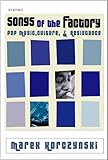Songs of the Factory : Pop Music, Culture, and Resistance / Marek Korczynski.
Material type: TextPublisher: Ithaca, NY : Cornell University Press, [2015]Copyright date: ©2015Description: 1 online resource (240 p.) : 1 line drawing, 2 tablesContent type:
TextPublisher: Ithaca, NY : Cornell University Press, [2015]Copyright date: ©2015Description: 1 online resource (240 p.) : 1 line drawing, 2 tablesContent type: - 9780801454813
- Industrial sociology -- England -- Midlands
- Music in the workplace -- England -- Midlands
- Popular music -- Social aspects -- England -- Midlands
- Working class -- England -- Midlands -- Social conditions
- Labor History
- Musical Arts & Ethnomusicology
- Sociology & Social Science
- POLITICAL SCIENCE / Labor & Industrial Relations
- worker culture, british factories, assembly line work, musical culture, music in the workplace, socio musicology, sociology of work, social order and resistance, modern workplace
- 781.59309424 23
- ML3922 .K67 2016
- online - DeGruyter
| Item type | Current library | Call number | URL | Status | Notes | Barcode | |
|---|---|---|---|---|---|---|---|
 eBook
eBook
|
Biblioteca "Angelicum" Pont. Univ. S.Tommaso d'Aquino Nuvola online | online - DeGruyter (Browse shelf(Opens below)) | Online access | Not for loan (Accesso limitato) | Accesso per gli utenti autorizzati / Access for authorized users | (dgr)9780801454813 |
Browsing Biblioteca "Angelicum" Pont. Univ. S.Tommaso d'Aquino shelves, Shelving location: Nuvola online Close shelf browser (Hides shelf browser)

|

|

|

|

|

|

|
||
| online - DeGruyter Against Immediate Evil : American Internationalists and the Four Freedoms on the Eve of World War II / | online - DeGruyter A Tremendous Thing : Friendship from the "Iliad" to the Internet / | online - DeGruyter American Power after the Financial Crisis / | online - DeGruyter Songs of the Factory : Pop Music, Culture, and Resistance / | online - DeGruyter Northern Men with Southern Loyalties : The Democratic Party and the Sectional Crisis / | online - DeGruyter What Galileo Saw : Imagining the Scientific Revolution / | online - DeGruyter Brotherly Love : Freemasonry and Male Friendship in Enlightenment France / |
Frontmatter -- Contents -- Acknowledgments -- 1. Reach Out I’ll Be There: Pop Music, Work, and Society -- 2. Stayin’ Alive at McTells -- 3. I Got All My Sisters with Me: Music and Community -- 4. Music, Machines, and Clocks: Songs and the Senses of Alienation -- 5. You Can Tell by the Way I Use My Walk: Music as Aid to Work and Critique of Taylorism -- 6. Pop Songs and the Hidden Injuries (and Joys) of Class -- 7. Collective Resistance on the Shop Floor -- 8. Dotted Lines on the Shop Floor: Cultural Connections with Collective Resistance -- 9. Conclusion: Pop Music, Culture, and Resistance -- Appendix: An Ethnography of Working and of Musicking -- References -- Index
restricted access online access with authorization star
http://purl.org/coar/access_right/c_16ec
In Songs of the Factory, Marek Korczynski examines the role that popular music plays in workers' culture on the factory floor. Reporting on his ethnographic fieldwork in a British factory that manufactures window blinds, Korczynski shows how workers make often-grueling assembly-line work tolerable by permeating their workday with pop music on the radio. The first ethnographic study of musical culture in an industrial workplace, Songs of the Factory draws on socio-musicology, cultural studies, and sociology of work, combining theoretical development, methodological innovation, and a vitality that brings the musical culture of the factory workers to life. Music, Korczynski argues, allows workers both to fulfill their social roles in a regimented industrial environment and to express a sense of resistance to this social order. The author highlights the extensive forms of informal collective resistance within this factory, and argues that the musically informed culture played a key role in sustaining these collective acts of resistance. As well as providing a rich picture of the musical culture and associated forms of resistance in the factory, Korczynski also puts forward new theoretical concepts that have currency in other workplaces and in other rationalized spheres of society.
Mode of access: Internet via World Wide Web.
In English.
Description based on online resource; title from PDF title page (publisher's Web site, viewed 26. Apr 2024)


